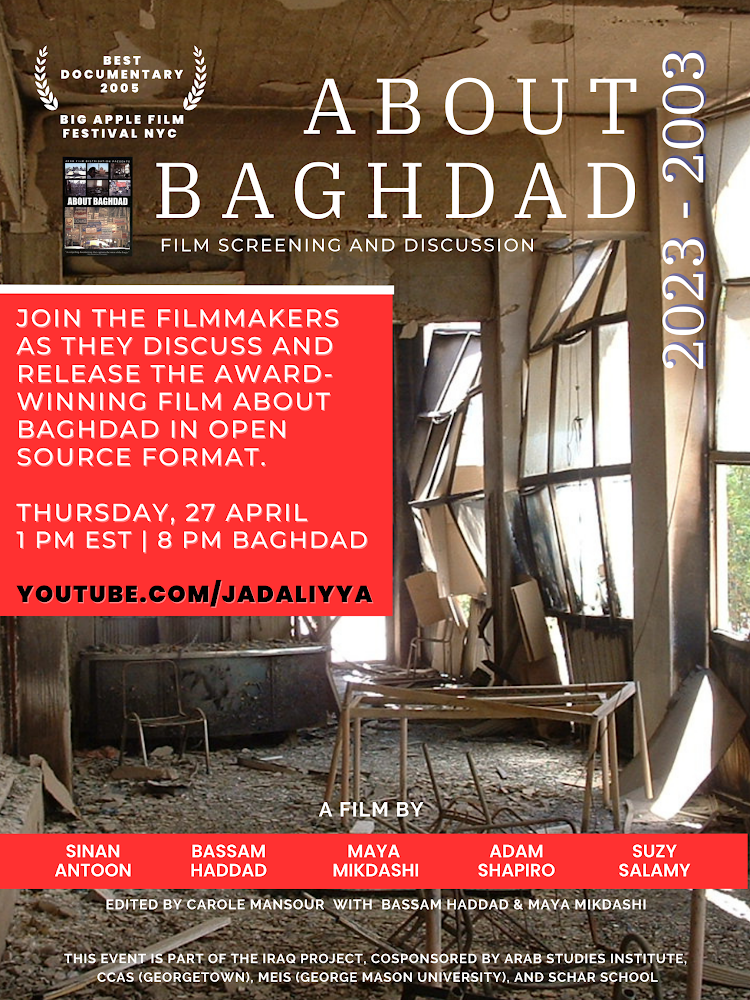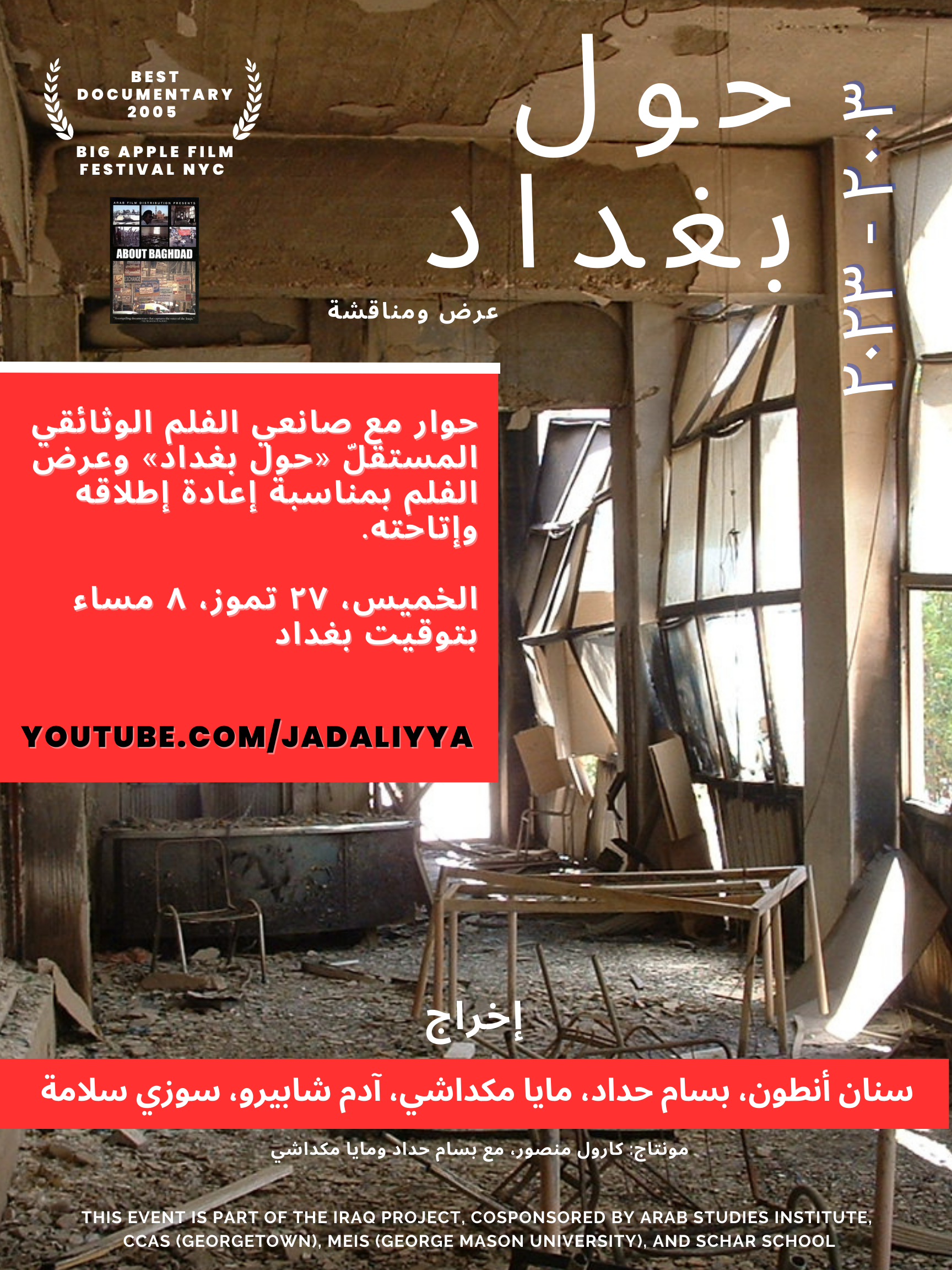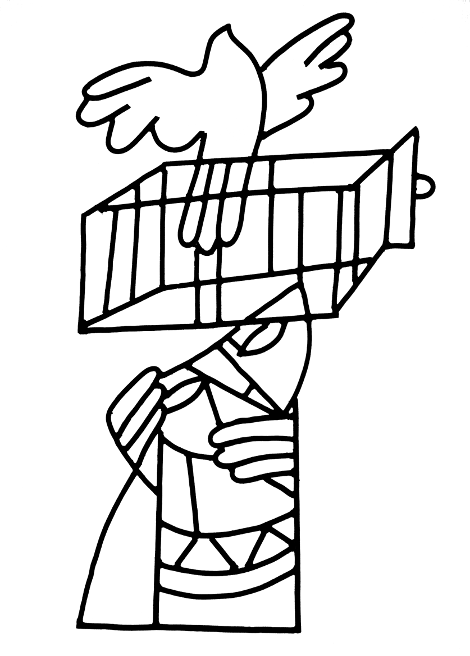About Baghdad
Film Screening and Discussion
Thursday, 27 April 2023
1:00 PM EST | 8:00 PM Baghdad
A Film by:
Sinan Antoon
Bassam Haddad
Maya Mikdashi
Adam Shapiro
Suzy Salamy
Cosponsored by Arab Studies Institute, Center for Contemporary Arab Studies (Georgetown University), Middle Eastern and Islamic Studies (George Mason University), Schar School of Policy and Government (George Mason University)
This event is part of the Iraq 2023 Project

Produced by Quilting Point Productions (formerly InCounter Productions), Arab Studies Institute.
“a stunning achievement, at once soulful and analytical, a veritable ode to Iraq,” Ella Shohat.
About Baghdad is the first film made about Iraq after the fall of the Ba’ath regime in July 2003. It won the “Best Documentary” prize at the Big Apple Film Festival Award in New York in 2004. It is perhaps the first effort to privilege the voices of the Iraqi people, from all walks of life as well as social, economic and ethnic backgrounds. While many have talked about and for the Iraqi people, few media outlets have sought to probe beyond the simplistic binary of pro-US/pro-Saddam perspective so often found in Western and Arab media portrayals of Iraq. About Baghdad presents Iraqis who describe the pain, complexity and suffering of living under decades of tyranny, oppression, wars, sanctions and now occupation. Silenced for so long by a regime that sought to replace the people with the image of just one man, and re-silenced by the bombs and occupation forces, the Iraqi people long to speak out and to claim their future. About Baghdad is a small step forward towards that goal in presenting audiences with their first opportunity to hear unadulterated Iraqi voices that should be privileged regardless of one’s perspective on the war and the justifications given for it.

REVIEWS
In these bad times when Western television networks, with few exceptions, have become an instrument of imperial propaganda, independent documentary films are needed more than ever before. This affecting film shot in post-occupation Baghdad privileges the people of Iraq and they have a great deal to say about both Saddam Hussein's rule and the US occupation. These are courageous voices rarely heard on Western television. Listen to them carefully. These are the people on whom Iraq depends for its future.
Tariq Ali, Author
Bush in Babylon and
The Clash of Fundamentalisms
About Baghdad is a stunning achievement, at once soulful and analytical, a veritable ode to Iraq. One of the filmmakers' return to Baghdad is far from being merely a geographical tour of post-Saddam Iraq; rather it is a voyage into the carnage inflicted on the psyche of a people abused by decades of massacre, rape, and torture, compounded by wars, sanctions, and occupation… Given the absence of Iraqi people speaking on the American media, About Baghdad provides a refreshing polyphony of Iraqi voices. Profoundly democratic in the true sense of the word, the film relays a non-monolithic representation of Iraqi people in terms of class, ethnic, religious, and gender, while also providing a full range of political perspectives, including communist, feminist and Islamicist. On trial are Saddam, the Ba'ath party, Arab and Muslim governments, along with the US and other imperial powers that allowed, directly and indirectly, the prolonged mutilation of Iraq. Interweaving a variety of Iraqi traditional songs to underscore a point or to illuminate the painfully absurd aspects of Iraqi existence, this chronicle of a 2003 summer visit to Baghdad turns the film into an unforgettable instance of contemporary cinema verité.
Ella Habiba Shohat, Professor
New York University
